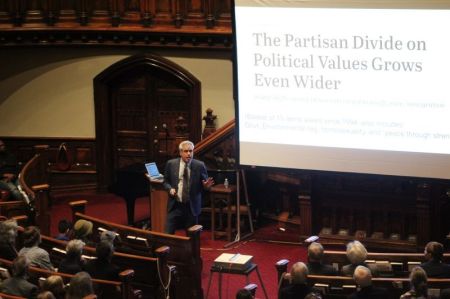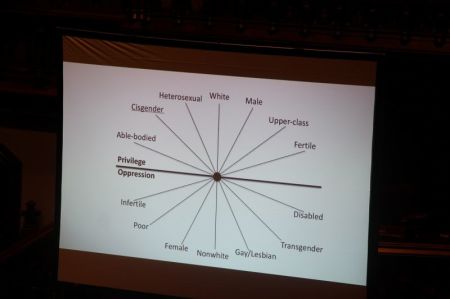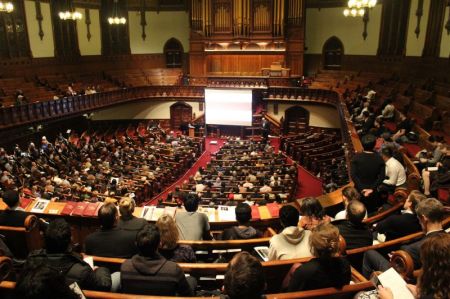Teaching Intersectionality in Polarized Culture Leads to Anti-White, Anti-Male Sentiments, NYU Prof Says

NEW YORK - Despite good intentions, the teaching of intersectionality in an increasingly polarized society is leading to angry anti-white, anti-male sentiments, warns Jonathan Haidt, a Jewish, atheist professor of social psychology at New York University whose scholarship is celebrated by many conservative Christians.
"The idea is bright and useful and if you watch your TED Talk it's good. It's nothing I object to. It's helpful... but here's the problem — when we teach intersectionality on American college campuses today, in a very polarized climate ... you're teaching people to see more differences. To divide people into the oppressor group and the oppressed group," Haidt said Thursday at the inaugural Anita and Antonio Gotto Lecture Series at Fifth Avenue Presbyterian Church.
The term "Intersectionality" was popularized by civil rights activist and legal scholar Kimberlé Crenshaw in 1989. Crenshaw wrote in a paper for the University of Chicago Legal Forum that traditional feminist ideas and antiracist policies exclude black women because they face overlapping discrimination unique to them.
"Because the intersectional experience is greater than the sum of racism and sexism, any analysis that does not take intersectionality into account cannot sufficiently address the particular manner in which Black women are subordinated," Crenshaw wrote in the paper.
Haidt, who recently co-authored The Coddling of the American Mind: How Good Intentions and Bad Ideas Are Setting Up a Generation for Failure with First Amendment expert Greg Lukianoff, highlighted the concept as part of a larger presentation that looked at how parents and educators were failing to prepare the next generation to be as strong and resilient as they need to be. He also discussed how a better understanding of human moral psychology can bring people together across political and religious divides and how the use of ancient wisdom can help put the nation back on the right path.

"This is not just categorization. This is a moral scheme. The people above the line are morally bad," he said pointing to an illustration of intersectionality. "They have privilege and they use that privilege, they guard that privilege and they will oppress others to maintain that privilege.
"And people here (oppressed) are morally good, they are victims ... there is some truth to that. There are of course some cases where this is true. But to take Americans, a multiethnic society, to take human beings who have evolved from tribalism who at the drop of a hat will divide into groups, to take them and to teach them to think this way even more than they are naturally inclined to is really regressive," he said.
The increasingly common result of teaching intersectionality he said is "really explicit angry anti-white or anti-male" sentiments which will not lead to a more inclusive harmonious society.
He cited a number of reasons including the fact that the parties are being purified, changes in Congress, changes in media, and increasing education as other factors that are leading to the increased polarization of America.
"People who have a college degree are much more vicious about political issues that are symbolic," he said. "They are not just focused on the pocketbook, they are more willing to fight cultural war issues. So as we get more educated we get more polarized."
Haidt argued that many of the polarizing trends will likely continue unless "we understand it and make some changes," which he is confident can be achieved.
"We are suffering from a lack of wisdom. The wisdom is there for us. It's there for the taking but we're not finding it. We're not teaching it," he said.

"In Proverbs, it is said that iron sharpens iron and one person sharpens the wits of another ... we need people to argue with us, we need people to challenge what we believe otherwise we don't get smarter, we don't get smarter," he said.
He noted that a few years ago his friend Lukianoff noticed a "complete rejection" of the wisdom contained in the proverb and they began to examine that trend. That exploration resulted in the writing of The Coddling of the American Mind: How Good Intentions and Bad Ideas Are Setting Up a Generation for Failure.
Haidt also drew on ideas highlighted in two of his previous books, The Happiness Hypothesis: Finding Modern Truth in Ancient Wisdom and The Righteous Mind: Why Good People Are Divided by Politics and Religion.
"It seems that with the string of bombings (bomb scares), many of us, I certainly have the feeling that this is yet one more step downward. That something is wrong with our country, something, it's hard to understand, another big step downward. What's next? How many more steps will there be before we reach the edge of the cliff?" he asked.
The Thomas Cooley Professor of Ethical Leadership at New York University's Stern School of Business said he believes that religious communities can help to diminish the growing polarization across America because "there is a spirit of forgiveness, tolerance, forbearance, willingness to give people the benefit of the doubt."
"I think that religious communities have the possibility to address these difficult issues that most parts of our society don't want to touch with an 11-foot pole," he said.
Among some of the solutions Haidt encouraged for the growing polarization is teaching all high school and college students about common cognitive distortions to improve critical reasoning skills.
He also urged parents and educators to allow children more unsupervised free-play time while limiting their screen time to no more than two hours each day. Keeping them off social media until high school is also a good idea.






















